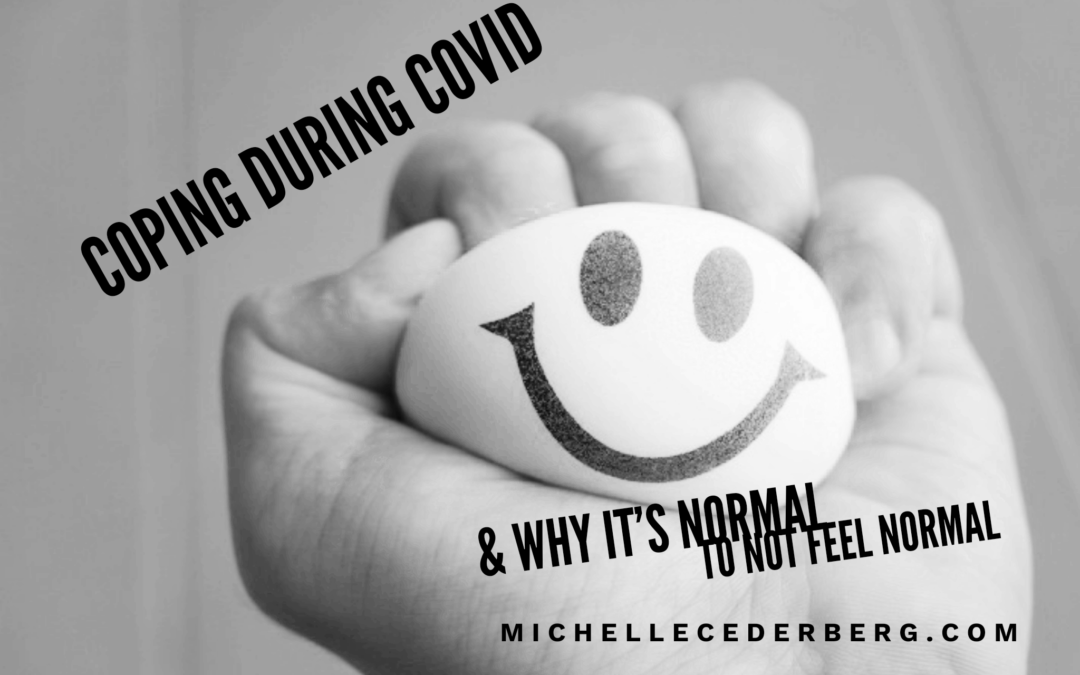“Breathe. Let go. And remind yourself that this very moment is the only one you know you have for sure.”
~ Oprah Winfrey
How are you coping these days? Several weeks into self-isolation you may be feeling a range of emotions from hopeful and positive to frustrated, anxious, and even sad. It’s all normal.
Work and life as we know it has been fully disrupted, and there is still so much uncertainty as to when it will all end, but hang in there. Focus on what you can control, which is this very moment.
Hello, Michelle Cederberg here. I am a Health and Productivity Expert, speaker and coach, sharing a message today around coping during Covid-19 and why, during these crazy times, it’s normal to not feel normal.
Sure, we all need to do our part to flatten the curve, stay positive, and try to be productive, but if you’re feeling at all anxious, sad, frustrated or restless, guess what… that’s normal!
It’s been several weeks since self-isolation and working from home began (for all except essential workers…thank you, if you’re one of them), and I’m sure you’re feeling the disruption is has created in your life:
- Your normal daily routine has been turned on its head
- Your daily social interactions have been changed or severely limited
- AND on top of it all, you have no real control over what is happening and when it will end.
Don’t underestimate the enormity of all that. Covid-19, self-isolation and everything to do with it is a high-stress experience. You’ve had to make a lot of adjustments in a short period of time, with working from home, juggling childcare and their schooling, taking care of basic needs like food, and worrying about other family and friends … and of course there’s the on-going uncertainty about how things will play out in the weeks ahead, and how our futures will be impacted.
If you’re feeling that stress it’s 100% normal, and it’s no doubt impacted how you feel. Stress causes and increase in stress hormones (cortisol, adrenaline and noradrenaline), which will not only increase feelings of fear and anxiety but will make it more difficult for you to think clearly and creatively as you try to work and keep it all together. This ‘fight or flight’ is your bodies way of ensuring you pay attention to your surroundings, so you stay safe, but it doesn’t always feel good, and it doesn’t always help you do your best work. So, do what you can.
If you’re feeling really unhappy, frustrated or anxious, do ask for help. Reach out to your employers EAP if you have one, connect with a counsellor or coach online, or a good friend, or family member. You don’t have to struggle through this on your own even in self-isolation. Especially in self-isolation.
As the weeks progress you might also begin to feel bored or depressed, that’s normal too. We’re generally creatures of habit and we’ll design our days around the very things that have been disrupted …our work routines, our connections with others, and having some sense of control over what we choose to do. For the moment, that’s all gone, and the impact of that can’t always be solved by baking bread or learning a new language or watching movies. Boredom is a completely natural reaction to not being meaningfully engaged in the world, and for the moment many sources of fulfillment are simply unavailable. So, if you struggle with boredom don’t put pressure on yourself to ‘fill the void’ with new productive pursuits. We can combat boredom by reminding ourselves that we are self-isolating as a form of community service, and this will eventually end.
While you may not have the energy to learn a new language or take up guitar, it’s not healthy to do nothing either. So, to create a sense of normalcy, establish a daily routine for you and the people in your household. At first, keep it simple …commit to one or two key work projects per day, daily work check-ins, some downtime, and some exercise…daily.
If you’ve got to juggle kids and work, a schedule will help. Just don’t put pressure on yourself to replicate your normal office day or your kids’ normal school day. Again, do what you can!
And, as part of your routine, Schedule in ‘micro lifts’ throughout your day. When working outside the home you naturally experience little ‘hits’ of joy through the day, like stopping at your favourite coffee shop, or going out for lunch or to the gym. In self-isolation you still need to have those lifts. Get creative; try a new exercise, bake something fun, connect with a friend or colleague for an online lunch.
Your emotions may also change from day to day from good to sad to worried or bored…and we can’t forget angry or frustrated. There’s so much we can’t control, there’s so much we still don’t know, and there’s a lot of questions around what will happen after all this. You might find yourself getting grumpy or hostile with family members, or you might say to yourself “I’m SICK OF SELF-ISOLATION…I’m done with it.” (which is not a good plan)
When frustration kicks in, reach out to others for a social visit. We’re social animals (even you introverts) and connection is good for our health and well-being. When we have conversations with people that we like, our body releases Oxytocin which is the ‘hug drug’, and you’ll feel more grounded and calm and gain a higher sense of control over the moment.
And hey, some people who will navigate the highs and lows of this much easier than most. If that’s you, that’s also normal … and very resilient. Keep doing what you’re doing.
One final thought… As you self-isolate, take care of your health. Prolonged stress weakens the immune system, plus anxiety can prompt comfort eating or stress drinking, and neither are good for your health in the long-term.
- Stick to regular meals, eat as healthily as you can, and be aware of stress snacking.
- Get some sort of movement every day – outside if you can. A 15-minute walk will do but try for longer sessions a couple days each week too.
- And make sure you get adequate sleep. It’s one of the best stress-busters out there.
Until next time, I’m Michelle Cederberg reminding you that now is the time to be kind and gentle with yourself and those around you as you ride out the rollercoaster that is Covid-19.
Take care of your health, limit your time on social media (I’m all about no news after nine p.m.) and find time for a bit of physically-distanced fun and relaxation too. You got this!
Michelle Cederberg, CSP, MKin, BA Psyc
CEP, CPCC, ORSC
Empowering today’s dreamers, leaders and go-getters to create the life and career they want.
![]()
www.michellecederberg.com
403-850-5589
Get Social with me on:
![]()
Instagram
My Facebook Page
Twitter
LinkedIn
YouTube


